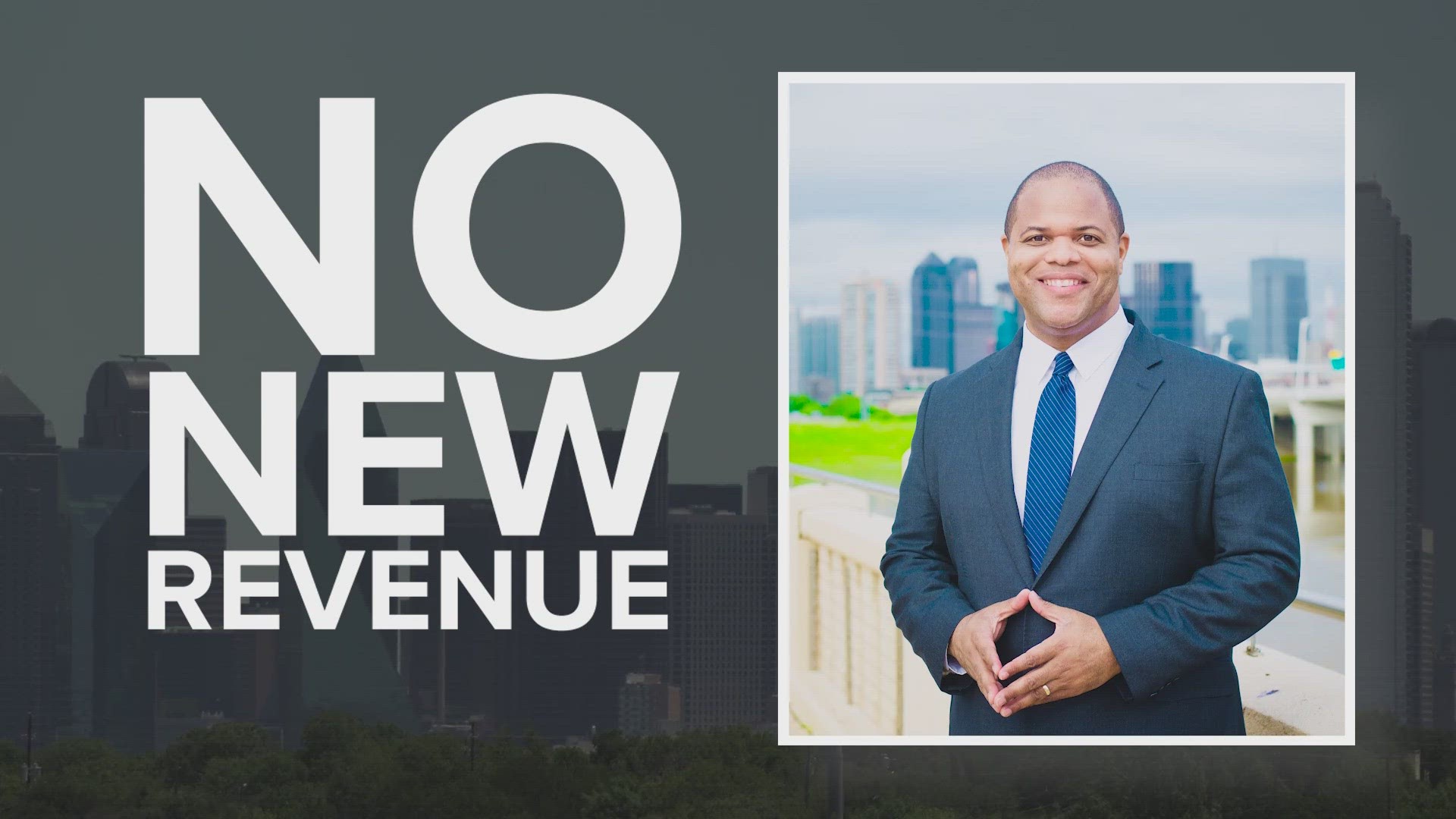DALLAS — Dallas Mayor Eric Johnson is endorsing a city councilmember’s plan to pass a budget featuring no new city revenue -- meaning a deep cut to the city’s tax rate after a 10.5 percent increase in appraised property values.
The current budget, as proposed by city manager T.C. Broadnax, calls for cutting the tax rate from 74.58 cents per $100 valuation to 73.93 cents -- the eighth straight year with a lower rate.
But that plan has faced pushback from some of the city's elected leaders.
“If we adopt the budget that’s being proposed with a slightly lower tax rate, everyone will get a bigger bill in the mail,” said Dallas City Council member Cara Mendelsohn.
Broadnax's proposed budget for the 2023-2024 fiscal year totals $4.63 billion. It includes a $1.8 billion general fund -- where most spending occurs -- that's up about 8% from last year's budget allotment.
Mendelsohn's own suggestion for what she calls a "no-new-revenue" proposal would see Dallas operate under the same $4.5 billion budget it did this past year, while operating at a decreased tax rate of 68.38 cents per $100 valuation. Her proposal, she said, would also still find the funds for a $5 million audit to search for efficiency opportunities within the budget, too.
Compared to this year's budget, Broadnax's plan would mean savings of about $20 for a homeowner with a $350,000 home. But Mendelsohn has argued that the actual cost incurred by Dallas homeowners will still go up because of property appraisal increases.
To make up the difference, her plan to stay at no new revenue focuses on the dissolution of what she calls "ghost jobs" -- government positions that haven’t been filled in at least nine months.
“We’re taxing people to pay for that position,” Mendelsohn said. “[But] the position isn’t going to get filled. And then we’re going to use the money for something else.”
An August 7 memo from Dallas Chief Financial Officer Jack Ireland said the no-new-revenue plan means cutting general fund expenses by $123.6 million.
"The City Manager does not recommend this tax rate nor these reductions," Ireland added.
In a memo issued Friday, Mayor Johnson, who has a history of publicly disagreeing with Broadnax, voiced support for Mendelsohn's amendment's to the city manager's budget.
In a statement to WFAA, Broadnax acknowledged receiving the mayor's memo and said his department is processing his request.
"I submitted the No-New-Revenue tax rate scenario as required by the City’s Financial Management Performance Criteria," Broadnax said. "I am reviewing the request from the Mayor and look forward to continued discussion regarding the FY24 Proposed Budget."
For all their differences, there are many areas in which the Broadnax and Mendelsohn plans are on the same page.
In both cases, most of the general fund budget goes toward public safety. They both also include a $49 million increase for police to hire 290 officers by the end of September 2024 and a $22 million fire department jump to bring on 100 firefighters.
The city manager’s budget also has $20 million more for IT after the city suffered a crippling ransomware attack earlier this summer.
Mendelsohn said she supports those increases. Her plan pays for them, she said, by having other city departments find 5 percent cuts in spending.
“Those departments [that have been earmarked for increases] really need that investment,” she said. “We have to pay our police officers more so they’ll stay. There’s a competitive market for officers in this day and age.”
Broadnax's proposal also included some additional new expenses to the budget -- including funds for creating more affordable housing, increasing city employees' minimum wage by 50 cents to $18.50 an hour and spending $700,000 on security improvements like lighting and cameras for trails and parks. His plan would additionally see $1.4 million spent on enforcing a new short-term rental ban by bolstering the codes enforcement department, and would also expand library hours and staffing at 15 locations across the city.
Mendelsohn said it's on department heads to figure out how to cut back their own offices' expenses and make the city's budget work.
“Those department managers know where they need to cut and use automation, innovation and efficiency to get where they need to be,” Mendelsohn said.
In the meantime, Dallas residents can still have their voices heard on the matter. The city is hosting town halls centering around the budget on Monday, Tuesday and Thursday, with a city council public hearing scheduled for Wednesday.

